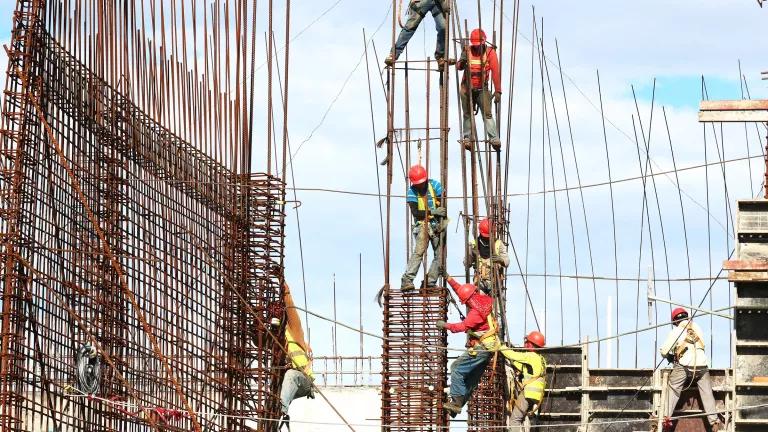Colorado Climate Progress: 2023 Year in Review
This past year saw continued climate action, with important policies that will reduce carbon emissions and air pollution while improving quality of life.

Colorado mountains in the fall
This blog is part of NRDC’s year-end series reviewing 2023 climate and clean energy developments.
In 2023, Colorado leaders—in the state legislature, in regulatory bodies, and in the governor’s office—continued their commitment to climate action, enacting a suite of landmark policies that will reduce carbon emissions and air pollution while improving Coloradans’ quality of life. Reducing emissions in the state requires bold action across sectors, changing how we produce energy, how we commute and get around, and how much energy our buildings and homes consume. This blog highlights key climate wins from 2023 in Colorado.
Transportation
Most of Colorado’s climate emissions come from transportation, and most of those transportation emissions come from light-duty vehicles like personal cars and pickup trucks. Therefore, reducing emissions from the cars on the road and providing people with more transportation options are critical.
Colorado Clean Cars: One of the biggest climate policies adopted by Colorado in 2023—and indeed, one of the biggest climate policies in its history—strengthens the state’s commitment to zero-emission vehicles. Adopted by the Air Quality Control Commission in October 2023, Colorado’s Clean Cars policy requires increasing the number of new clean cars being sold in the state each year, until 82 percent of new vehicles sold are electric or a plug-in hybrid by 2032. While the state stopped short of what eight other states have adopted (reaching 100 percent of new vehicles sold by 2035), Colorado will consider full adoption of the rule by 2029.
Advanced Clean Trucks: In April 2023, Colorado adopted two historic standards to reduce emissions from heavy trucks and spur the transition to clean and electric trucks. The rules are a win for public health, the climate, the economy, and a hard-fought win for environmental justice. The pollution from trucks particularly impacts low-income residents and people of color since past policy decisions have placed industry and freight traffic disproportionately in those communities.
Yet, there is more to be done. In November 2023, an analysis commissioned by the state found that Colorado is off track to achieve near-term climate targets for 2025 and 2030, unless further policies are implemented. In particular, as reported by Colorado Public Radio, emissions from the transportation sector are far exceeding projections, while other sectors like buildings, electricity, oil, and gas are more likely to hit their anticipated reductions.
A new NRDC scorecard points to areas of opportunity for Colorado to build a climate-friendly transportation system. Despite ranking seventh nationwide in its progress toward aligning transportation policy and spending with climate goals, a significant loss of points lies in the amount of funding allocated by the state for public transportation services and multimodal transportation infrastructure.
Buildings
Improving energy efficiency and avoiding burning fossil fuels, like the gas in our homes and other buildings, is a key climate opportunity, and it can greatly reduce Coloradans’ monthly costs.
Building codes for new buildings: Legislation in 2022 established a new state board, made up of representatives from local governments, labor, environmental organizations, developers, and more, who are tasked with setting code minimums for more efficient new buildings. In June 2023, the statewide Energy Code Board established new requirements for building codes in the state, ensuring that new construction is prewired and equipped to charge electric vehicles, potentially host rooftop solar, and accommodate electric appliances.
Improved efficiency for existing buildings: Given how long buildings last once they are constructed, making existing buildings more efficient is critical. In August 2023, Colorado passed nation-leading standards that reduce energy usage over time in the state’s largest buildings by improving energy efficiency and insulation, installing more efficient appliances, and using renewable electricity like solar. The new Building Performance Standards apply to about 8,000 of Colorado’s largest buildings, including roughly 1,000 multifamily buildings. Colorado now joins the city of Denver with a building performance policy, along with a handful of other cities and just four other states.
Utility investment in energy efficiency and electrification: In June 2023, the Colorado Public Utilities Commission approved ambitious new building electrification and energy efficiency goals for Xcel Energy, the state’s largest utility. The decision approved more than $429 million for programs to benefit Xcel customers, helping people to swap out gas furnaces for more efficient electric heat pumps, add insulation to their homes, and replace old appliances with more efficient electric ones. The commission also directed the utility to promote programs specifically for low-income and disproportionately impacted communities.
Power
Commitment to renewable energy and storage: The two largest electricity providers in Colorado have submitted ambitious proposals to develop significant amounts of wind, solar, and battery storage, while seeking to minimize fossil fuel power production. Xcel has proposed a plan that would double the amount of renewable energy on its system in the state, adding 6,500 megawatts (MW) of new renewables and storage capacity; the Public Utilities Commission should make a decision on Xcel’s plan by the end of 2023. Meanwhile, Tri-State’s proposed resource plan would accelerate the retirement of a coal-fired power plant while adding an additional 1,250 MW of renewable energy to its system; that plan will be considered in the coming months.
In 2023, the Colorado legislature also passed a number of important bills, highlighted in an earlier blog. The 2024 legislative session will kick off in early January, once again promising to be a busy four months for securing critical climate reforms. Key climate legislation on the 2024 agenda includes:
- Accelerating the transition to electric heat pumps to heat and cool buildings and homes
- Encouraging transit-friendly development and more efficient land use through thoughtful growth policies
- Ensuring the electrical grid can support electrification and housing development goals
- Transitioning all electricity generation to clean energy, requiring utilities to reach near-zero emissions from electricity production by 2040
- Securing significant increases in funding to improve transit service
This year was one of historic climate policies in Colorado; 2024 must bring the same level of commitment as we seek to meet critical climate goals and advance equitable outcomes in the state.



